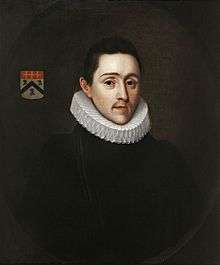Matthew Wren
Matthew Wren (3 December 1585 – 24 April 1667) was an influential English clergyman, bishop and scholar.
Matthew Wren | |
|---|---|
| Bishop of Ely | |
 | |
| Church | Church of England |
| Diocese | Diocese of Ely |
| In office | 1638–1667 |
| Predecessor | Francis White |
| Successor | Benjamin Lany |
| Other posts | Bishop of Hereford (1634–35) Bishop of Norwich (1635–38) |
| Personal details | |
| Born | 3 December 1585 Parish of St Peter, Westcheap, London |
| Died | 24 April 1667 (aged 81) Ely House, Holborn, London |
| Buried | Pembroke College, Cambridge |
| Nationality | English |
| Denomination | Anglican |
| Spouse | Elizabeth Cutler |
| Education | Merchant Taylors' School |
| Alma mater | Pembroke College, Cambridge |
Life
He was the eldest son of Francis Wren, citizen and mercer of London,[1] only son of Cuthbert Wren, of Monk's-Kirby, in the county of Warwick, second son of William Wren, of Sherborne-House and of Billy-Hall in the bishopric of Durham.[2] He was descended from an ancient family which came originally from Denmark.[3]
He was the brother of Christopher Wren, and the uncle of Sir Christopher Wren.
He attended Merchant Taylors' School and proceeded in 1601 to Pembroke College, Cambridge, where he was a protégé of Lancelot Andrewes. He became a Fellow in 1605 and later President. He was Master of Peterhouse from 1625 to 1634.[4][5] From this point, his rise was rapid. He accompanied Charles I to Holyrood Palace for his Scottish coronation in 1633, and was appointed chaplain and Clerk of the Closet. He became Bishop of Hereford in 1634, Norwich in 1635, and Ely in 1638.
However, his strong support of Archbishop Laud, and his toughness on Puritans, led to his being imprisoned in the Tower of London by the Parliamentarian faction from 1642 to 1660.[6] Unlike Laud, he survived, and was allowed the freedom to write notes on improvements to the Book of Common Prayer, on which he later had some influence.
While in the Tower, he vowed to devote a sum of money to "some holy and pious employment" should he be released. To fulfill this vow, he chose to pay for a new Chapel for Pembroke College, and had it built by his nephew Christopher Wren — one of his first buildings, consecrated in 1665. Matthew Wren also led the movement to rebuild St Paul's Cathedral after it had been damaged by the Puritans, and again his nephew accomplished the task.
He married Elizabeth, daughter of Thomas Cutler of Ipswich. Their eldest son was Matthew Wren, secretary to the Duke of York.
He died at Ely House, Holborn, on 24 April 1667, and was buried in the chapel he had built at Pembroke Hall, Cambridge.[7]
Theology
Wren was well acquainted with the Dutch Arminian literature.[8] He was himself firmly attached to the Arminian views.[9]
List of appointments
- President of Pembroke College
- Prebendary of Winchester
- Master of Peterhouse, 1625–1634
- Chaplain to the then Prince Charles (later Charles I)
- Vice-Chancellor of the University of Cambridge, 1628–1629
- Dean of Windsor and Wolverhampton
- Registrar of the Order of the Garter
- Clerk of the Closet 1633–36
- Governor of Charterhouse, London
- Bishop of Hereford
- Prebendary of Westminster
- Bishop of Norwich
- Dean of the Chapel Royal, London
- Bishop of Ely
Notes and references
Citations
- Mathew David (1948). The Social Structure In Caroline England.
- Wren, Christopher (1750). Parentalia Or Memoirs of the Family of the Wrens Viz. of Mathew Bishop of Ely, Christopher Dean of Windsor ... But Chiefly of --- Surveyor-general of the Royal Buildings ... Now Published by Stephen Wren. Osborn.
- Crabb, George (1833). Universal Historical Dictionary: Or, Explanation of the Names of Persons and Places in the Departments of Biblical, Political, and Ecclesiastical History, Mythology, Heraldry, Biography, Bibliography, Geography, and Numismatics. Baldwin and Cradock, and J. Dowding.
- "Wren, Matthew (WRN604M)". A Cambridge Alumni Database. University of Cambridge.
- Phillimore, Lucy (30 November 2007). Sir Christopher Wren: His family and his times, 1585-1723. Kessinger Publishing. ISBN 978-0-548-80595-4.
- Cranfield, Nicholas. "Wren, Matthew". Oxford Dictionary of National Biography.
- Wikisource:Wren, Matthew (1585-1667) (DNB00)
- Milton 2002, p. 436.
- Tyacke 2001, pp. 123, 217.
Sources
- Milton, Anthony (2002). Catholic and Reformed: The Roman and Protestant Churches in English Protestant Thought, 1600-1640. Cambridge: Cambridge University Press.CS1 maint: ref=harv (link)
- Tyacke, Nicholas (2001). Aspects of English Protestantism C. 1530-1700. Manchester: University Press.CS1 maint: ref=harv (link)
External links
- . Dictionary of National Biography. London: Smith, Elder & Co. 1885–1900.
- A Parliamentarian view of him and of his arrest
| Academic offices | ||
|---|---|---|
| Preceded by Leonard Mawe |
Master of Peterhouse, Cambridge 1625–1635 |
Succeeded by John Cosin |
| Church of England titles | ||
| Preceded by Augustin Lindsell |
Bishop of Hereford 1634–1635 |
Succeeded by Theophilus Feild |
| Preceded by Richard Corbet |
Bishop of Norwich 1635–1638 |
Succeeded by Richard Montagu |
| Preceded by Francis White |
Bishop of Ely 1638–1667 |
Succeeded by Benjamin Lany |